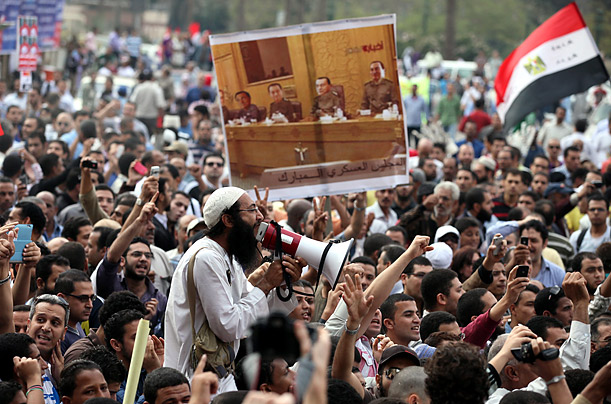
Egyptian protesters shout slogans during a protest against the ruling military council at Tahrir square, in Cairo, Egypt, Oct. 28, 2011. (Photo: Khaled Elfiqi / EPA)
This past Wednesday, walking home from dinner, I stumbled into a couple hundred Occupy Wall Street protesters noisily charging through Soho in solidarity with the throngs at Occupy Oakland who had been tear-gassed by police the day before. They were marching in the middle of the street, chanting and singing and disrupting traffic while countless New Yorkers looked on, some bemused, others applauding. Along MacDougal Street, the protesters strolled right through the set of Gossip Girl and then veered off toward Union Square, eventually melting away in the face of a massive (and, in this reporter’s estimation, excessive) police response. Immortalized already by a legion of tweets, the action seemed to have done its job.
In Egypt, though, such provocative displays of dissent have come with far higher stakes. In earlier posts about the global dimensions of the Occupy Wall Street movement, commenters have bridled at the suggested connection between what’s transpiring in Lower Manhattan and the struggle of millions in Egypt to free themselves from dictatorship. Fair enough. But there are those in Cairo who see the link. While thousands rallied again in Tahrir Square today, voicing, as they have for months, their disquiet with Egypt’s interim military government, activists processed from the square to the U.S. embassy. Why? In support of Occupy Oakland — you can see pictures of the protest here (read the signs).
(PHOTOS: Occupy Wall Street goes global.)
Of course, the march on the U.S. embassy was a sideshow to what really mattered. Many Egyptians are frustrated by the military’s reluctance to transfer power to civilian rule. A staggered series of parliamentary elections begin late November, but the military has prolonged its mandate and will keep power through till 2013. The uncertainty surrounding the top brass’ intentions has been compounded by allegations of human rights abuses and anger at the prevalence still of remnants of the bad old regime of ousted autocrat Hosni Mubarak.
Though separated by thousands of miles, activists in Cairo connected the fate of Essam Atta, a 24-year-old Cairene detained by a military tribunal and then allegedly tortured to death earlier this week, with that of Scott Olsen, also 24, the U.S. marine turned protester whose skull was apparently fractured by a tear gas canister fired by Oakland police. One sign in the march echoed a stirring rallying call of solidarity: “From Egypt to Wall Street, don’t [be] afraid, go ahead.” Showing the activists’ awareness of social media, many of the posters sport Twitter #hashtag clauses.
In a caustic tweet, Marc Lynch, a prominent Middle East expert in Washington, poured cold water on the solidarity march: “Egyptian activists’ plan to march Friday to support Occupy Oakland shows a keen ear for the priorities of the Egyptian public.” Indeed, Islamists, including the more puritanical Salafists, led the main rally in Tahrir Square and it’s these political forces that look poised for considerable success should elections go off without a hitch. They are streets ahead of Tahrir Square’s celebrated, but disorganized — some would say naive — liberals, the sort of Twitteratti moved by events in Oakland.
Yet, as I’ve written before, there’s something undeniably important and unique about this moment in global political culture. Connected by the Internet, empathy and a transcendent sense of injustice — be it ire against banks or secret police, fat cats or tyrants — they are sparking conversations and connecting dots that have never been drawn so instantaneously before. The message may still seem to some ephemeral or inchoate, but countless millions are hearing it.
Ishaan Tharoor is a writer for TIME and editor of Global Spin. You can find him on Twitter at @ishaantharoor. You can also continue the discussion on TIME‘s Facebook page and on Twitter at @TIMEWorld.

